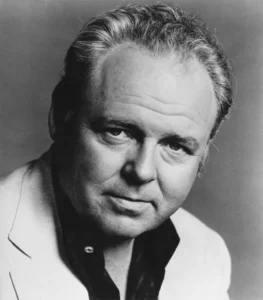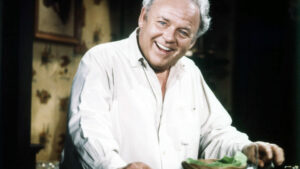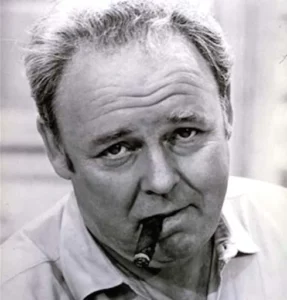The Man Behind Archie Bunker: Carroll O’Connor’s Rise to Fame
Carroll O’Connor became a television legend through his portrayal of Archie Bunker on the groundbreaking sitcom ‘All in the Family’. Born in 1924, O’Connor’s journey to stardom was long and challenging. He honed his craft on stage before transitioning to television, where he would eventually create one of the most memorable characters in TV history.
When ‘All in the Family’ premiered in 1971, it revolutionized television comedy by tackling controversial topics like racism, sexism, and political division. O’Connor’s performance as the cantankerous, politically incorrect patriarch earned him four Emmy Awards and made him a household name. His portrayal was so convincing that many viewers couldn’t separate the actor from the character, which became both a blessing and a curse for O’Connor’s career.

The Dark Reality: ‘Difficult and Often Abusive’
Despite his on-screen success, Carroll O’Connor’s behavior behind the scenes painted a drastically different picture. Executive producer Norman Lear and various crew members have openly discussed O’Connor’s volatile temperament and abusive conduct during production. His explosive outbursts and unpredictable mood swings created a tense atmosphere that affected everyone on set.
O’Connor’s perfectionism bordered on obsession. He demanded absolute control over his character’s development and frequently clashed with writers, directors, and fellow actors over creative decisions. His intense commitment to authenticity often manifested as harsh criticism and verbal attacks on those around him. Cast members walked on eggshells, never knowing which version of O’Connor would show up each day.

The Root of the Problem: Fame, Pressure, and Personal Demons
Understanding O’Connor’s difficult behavior requires examining the immense pressure he faced. The weight of carrying a groundbreaking show while portraying such a controversial character took its toll. O’Connor struggled with alcohol abuse and suffered profound personal losses, including the tragic death of his son Hugh in 1995, though this occurred after the show’s original run.
The actor’s perfectionism stemmed from a deep fear of failure and a desperate need to maintain control in an industry that often strips actors of their autonomy. His personal struggles with addiction and depression manifested in workplace aggression, creating a cycle of toxic behavior that affected everyone around him.
How the Cast Survived O’Connor’s Temper
Jean Stapleton, who brilliantly portrayed Edith Bunker, developed a unique understanding of O’Connor’s complex personality. She recognized the pain beneath his anger and maintained a professional relationship built on mutual respect. Stapleton’s patience and emotional intelligence helped defuse many potentially explosive situations on set.
Rob Reiner, who played Mike Stivic, experienced frequent conflicts with O’Connor. Their on-screen chemistry as adversaries mirrored real-life tensions. However, Reiner later acknowledged that he understood the immense pressure O’Connor faced and harbored no lasting resentment. The cast’s ability to separate professional obligations from personal feelings kept the show running despite the backstage drama.

The Show’s Triumph Despite the Chaos
Remarkably, ‘All in the Family’ became one of television’s most successful and influential series despite the turbulent production environment. The show dominated ratings for five consecutive years and sparked national conversations about social issues that had long been taboo on television. O’Connor’s portrayal of Archie Bunker, while controversial, forced Americans to confront their own prejudices and biases.
The chemistry among the cast members translated beautifully on screen, proving that professional excellence can sometimes emerge from difficult circumstances. The show’s legacy extends far beyond its original run, influencing countless sitcoms that followed and establishing a template for socially conscious comedy.
O’Connor’s Later Years and Redemption
After ‘All in the Family’ ended, Carroll O’Connor found redemption through his role as Chief Bill Gillespie in ‘In the Heat of the Night’. This character allowed him to showcase a different dimension of his acting ability while demonstrating personal growth. Colleagues from this later period described a mellower, more generous O’Connor who had learned from his past mistakes.
O’Connor became known for his warmth and mentorship of younger actors in his later career. He actively worked to overcome his demons and rebuild relationships damaged during his ‘All in the Family’ years. This transformation revealed a man capable of profound change and self-reflection.
The Lasting Impact on Television and Culture
Carroll O’Connor’s contribution to television history remains undeniable. His fearless portrayal of Archie Bunker changed the landscape of American comedy by proving that entertainment could simultaneously tackle serious social issues. The show paved the way for future programs to address controversial topics while maintaining mass appeal.
O’Connor’s complex legacy serves as a reminder that artistic genius often comes with personal struggles. His story illustrates the importance of mental health support in high-pressure creative environments and the need for industry reforms to protect cast and crew from abusive behavior.
Conclusion: A Legacy of Contradictions
Carroll O’Connor’s life embodies the contradictions inherent in fame and artistic achievement. He created an iconic character that changed television forever while simultaneously creating a difficult work environment that affected countless colleagues. His journey from troubled perfectionist to respected elder statesman demonstrates that personal growth is possible even after years of destructive behavior.
O’Connor’s story reminds us that our heroes are human, flawed individuals who struggle with the same demons that affect us all. His legacy encompasses both his brilliant performances and his personal failures, offering valuable lessons about the cost of fame and the possibility of redemption.
FAQs:
1. What made Carroll O’Connor so difficult to work with? His obsessive perfectionism, need for control, and personal struggles with alcohol created a volatile personality that manifested in abusive behavior toward cast and crew.
2. Did Carroll O’Connor’s behavior improve later in his career? Yes, colleagues from ‘In the Heat of the Night’ reported that O’Connor became much warmer and more collaborative in his later years.
3. How did the cast of ‘All in the Family’ cope with O’Connor’s temper? Through professionalism, patience, and understanding of the pressures he faced, particularly from Jean Stapleton, who maintained a respectful working relationship despite the challenges.